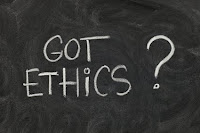There are actually many ethical issues involved in grant writing, many more than I expected when I first began my journey as a professional grant writer. Here are four of the most common ethical issues you need to avoid if you are a professional grant writer:
- Lying in a proposal. I have to admit that I have always assumed that everyone would know that lying in a grant proposal is ethically wrong, but you’d be surprised how many times I have heard people try to justify it. Don’t try to exaggerate your need for the grant or include program activities that you don’t intend on implementing. Just tell the truth.
- Reusing narrative written for another client. It’s very tempting, especially when you’re overworked and tired, to just lift some narrative that you wrote for another client for the same grant last year to put in someone else’s narrative this year. Don’t do it. If you get caught (especially by a reader scoring the grant), you risk not being funded, but it’s just plain wrong anyway. If you are being paid for original narrative, write original narrative. If you can’t think of another way to say what you need to say, don’t take the job.
- Poaching funding sources. I heard this horror story when I met with a local non-profit administrator last week. A private funding source had invited the non-profit to submit a proposal. This particular funding source does not accept unsolicited proposals. The non-profit asked its grant writer (an outside consultant) to write a proposal to this funding source. The grant writer wrote a proposal and submitted it. A couple of weeks later, the non-profit administrator got a phone call from the funding source saying that the grant writer had actually submitted several proposals – the one the funding source had requested as well as proposals on behalf of several other organizations the grant writer worked with. None of these other proposals were part of the solicitation. The grant writer had just taken it on herself to try to squeeze in some of her other clients in competition with the client making the original request. I’m sure she assumed they would not know or find out. To make matters worse, the representative from the funding source told the non-profit administrator that of the several proposals submitted by that grant writer, the weakest one from from the original agency requesting the work. The non-profit organization that originally asked the grant writer to submit the proposal was ultimately not funded.
- Telling a client that they can pay for grant writing services out of the grant when they can’t. There is some debate in the field about whether charging a contingency fee for grant writing services is ethical or not. Some people insist that contingency fees are unethical, but then call it a “bonus” for getting funded and call that ethical. The real issue, though, is not whether or not it’s a contingency fee, but where that fee comes from. If you tell someone they can pay the fee out of the grant when they can’t, you have essentially lied to them. Very few funding sources allow you to pay for grant writing services out of a grant itself (there are, however, some that do).
The bottom line is that integrity matters. Trying to cut ethical corners may seem like a profitable decision at the time, but in the end it is not the way to build a successful grant writing career.
————————————-
Do you really need a grant writer? Download this article to help you decide.
Free e-book – Using Social Media to Increase Your Business
Secrets of Successful Grant Writers online seminar..






